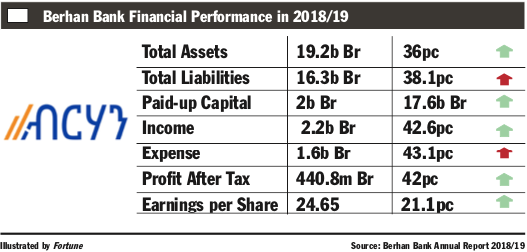
Fortune News | Jan 11,2020
Aided by investment income, Oromia International Bank, one of the mid-sized commercial banks, netted 860.5 million Br in profits during the past fiscal year. Its profit posted a 15pc expansion from the previous year.
Despite this considerable increase, Oromia's earnings per share (EPS) slowed to 320 Br, a 16pc decline from a year ago. Last year's EPS is far lower than the 525 Br value recorded three years ago.
A massive injection of paid-up capital caused the reduction in EPS. The Bank increased its paid-up capital by 26pc to three billion Birr, making it one of the better capitalised commercial banks.
Putting his Bank's performance in the context of the country's economic situation, Asegid Regassa, board chairperson of Oromia, asserted that the country's macroeconomic data showed a better-than-expected outcome in the last fiscal year. His statement is contrary to those of many board chairpersons of banks and insurance companies.
Asegid cited better tax collection performance, bank lending, export figures, airline receipts, and industrial park activities as strong economic signs. But he also explained the key challenges facing the banking industry and his Bank as well.
The Novel Coronavirus (COVID-19) pandemic, high inflation, the foreign currency crunch, and reduced activity in a few COVID-19 affected sub-sectors were key challenges of the Bank, according to Asegid.
Teferi Mekonnen, president of the Bank, says that the management used an out-of-the-box approach to overcome these challenges and use them as opportunities.
"We finished the year with a pretty encouraging bottom line of six percent year-on-year growth during such an unprecedented year full of unexpected institutional and national spending and loss of target earnings," he said.
Oromia's income from interest on loans, advances and investments in National Bank of Ethiopia (NBE) bonds and income from interest-free financing soared by 27.1pc to 3.1 billion Br. However, revenues from service charges and commissions dropped by 20pc to 522.4 million Br, while gains on foreign exchange dealings sank by 55.6pc to 65 million Br.
"The reduction in service charges and commissions is concerning," commented Abdulmenan Mohammed, a financial statement analyst. "The management should pay attention to this area of business."
The fall in bank service charges and commissions is explained by the lockdown sustained by global trade in general and that of local trade in particular, according to Teferi.
A reduction in gains on foreign exchange dealings has been observed across commercial banks. While some banks' gains declined, others have reported zero earnings or even losses from foreign currency dealings last year. The bankers cited the Birr's depreciation against a basket of major foreign currencies and slowed global trade activity as causes.
Over the past couple of years, the annual pace of nominal depreciation of the Birr has been gradual and quite stable at about five percent. However, throughout the past year, the local currency has been continually devaluing by approximately 0.3pc every week.
"Foreign exchange dealings in which we deal with the NBE [when available] aren't among regular business both in volume and frequency," said Teferi. "It's an insignificant component of our income, and the margin is very tight even during a normal situation. Last year it was almost not available."
A considerable expansion of expenses accompanied the improved income. Oromia’s interest expense increased by 49pc to 1.2 billion Br. Spending on salaries and benefits went up by 21pc to 968 million Br. General administration expenses increased by 26.5pc to a little over half a billion Birr.
Last fiscal year, Oromia opened 35 new branches, pushing its network to 300. The number of its agents and Automated Teller Machine (ATM) terminals reached 237 and 123, respectively. Its human resources stood at 6,002 employees, 4,066 of which are permanent.
The Bank has increased loans, advances and interest-free financing by 17pc to 20.3 billion Br. Deposits also grew incrementally by four percent to 27.7 billion Br. The loan-to-deposit ratio increased to 73pc from 65pc.
The increase in this ratio is very impressive, according to Abdulmenan.
"However, it should take extra care against any further increase as it may undermine its liquidity level," he said.
The provision for loans and advances fell to zero from the 155.8 million Br figure of the previous year.
The reduction in provision for the impairment of loans and other assets shows that the Bank had good credit management practices, for which the management should be applauded, according to Abdulmenan.
The total assets of the Bank grew by six percent and reached 33.8 billion Br. Its liabilities registered a minor growth of 2.1pc to 29.2 billion Br.
Oromia’s investment in NBE bills fell by 14pc to 6.1 billion Br. These investments represent 18pc of total assets and 22pc of total deposits of the Bank.
The NBE bill investment of most banks declined last year as the central bank repealed the mandatory bill that required banks to surrender 27pc of their gross loans and advances. Having a maturity period of five years with an annual five percent interest rate, the bill aimed to mobilise funding for the Development Bank of Ethiopia, which serves as a policy bank to finance priority areas.
Oromia's cash and bank balances increased by four percent to 5.3 billion Br. The ratio of liquid assets to total assets dropped by 0.4 percentage points to 15.6pc, and liquid assets to total liabilities increased by 0.3 percentage points to 18.2pc.
Oromia has a capital adequacy ratio of 20.4pc, which demonstrated that it has strong capital, according to Abdulmenan.
PUBLISHED ON
Jan 09,2021 [ VOL
21 , NO
1080]

Fortune News | Jan 11,2020

Radar | Sep 19,2020

Radar | Oct 09,2021

Fortune News | Jul 19,2025

My Opinion | Mar 09,2024

Radar | Apr 01,2024

Advertorials | Sep 13,2021

Radar | May 14,2022

Fortune News | Feb 16,2019

Radar | Apr 16,2022

Dec 22 , 2024 . By TIZITA SHEWAFERAW
Charged with transforming colossal state-owned enterprises into modern and competitiv...

Aug 18 , 2024 . By AKSAH ITALO
Although predictable Yonas Zerihun's job in the ride-hailing service is not immune to...

Jul 28 , 2024 . By TIZITA SHEWAFERAW
Unhabitual, perhaps too many, Samuel Gebreyohannes, 38, used to occasionally enjoy a couple of beers at breakfast. However, he recently swit...

Jul 13 , 2024 . By AKSAH ITALO
Investors who rely on tractors, trucks, and field vehicles for commuting, transporting commodities, and f...

Oct 25 , 2025
The regulatory machinery is on overdrive. In only two years, no fewer than 35 new pro...

Oct 18 , 2025
The political establishment, notably the ruling party and its top brass, has become p...

Oct 11 , 2025
Ladislas Farago, a roving Associated Press (AP) correspondent, arrived in Ethiopia in...

Oct 4 , 2025
Eyob Tekalegn (PhD) had been in the Governor's chair for only weeks when, on Septembe...